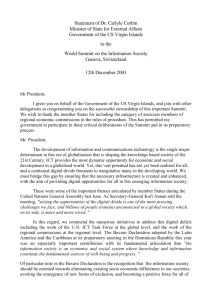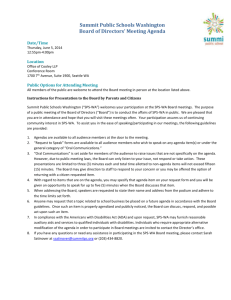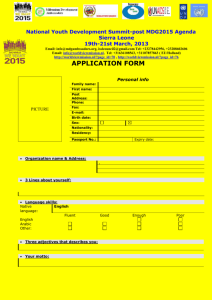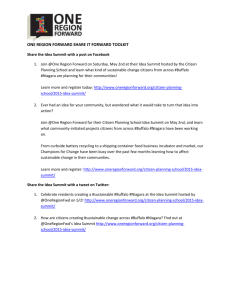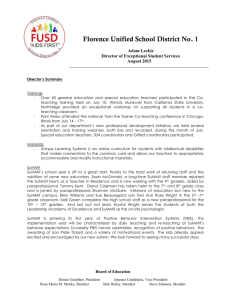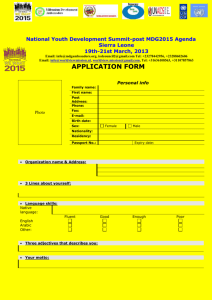WSSD Secretariat`s Overview of the Regional Prep Meetings
advertisement
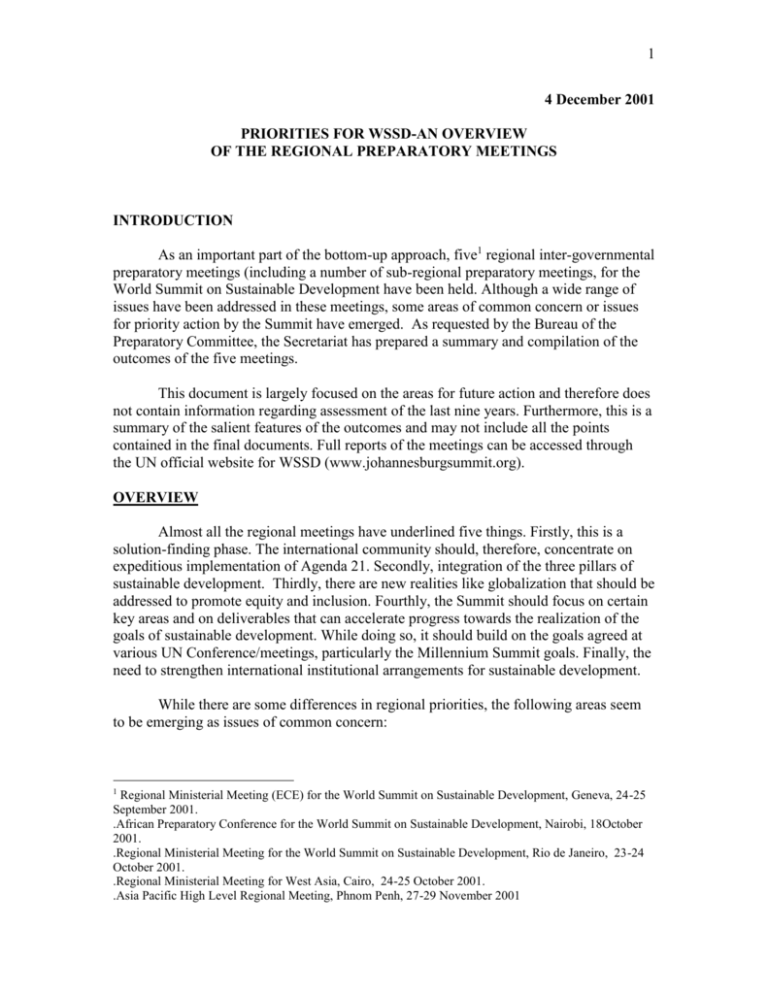
1 4 December 2001 PRIORITIES FOR WSSD-AN OVERVIEW OF THE REGIONAL PREPARATORY MEETINGS INTRODUCTION As an important part of the bottom-up approach, five1 regional inter-governmental preparatory meetings (including a number of sub-regional preparatory meetings, for the World Summit on Sustainable Development have been held. Although a wide range of issues have been addressed in these meetings, some areas of common concern or issues for priority action by the Summit have emerged. As requested by the Bureau of the Preparatory Committee, the Secretariat has prepared a summary and compilation of the outcomes of the five meetings. This document is largely focused on the areas for future action and therefore does not contain information regarding assessment of the last nine years. Furthermore, this is a summary of the salient features of the outcomes and may not include all the points contained in the final documents. Full reports of the meetings can be accessed through the UN official website for WSSD (www.johannesburgsummit.org). OVERVIEW Almost all the regional meetings have underlined five things. Firstly, this is a solution-finding phase. The international community should, therefore, concentrate on expeditious implementation of Agenda 21. Secondly, integration of the three pillars of sustainable development. Thirdly, there are new realities like globalization that should be addressed to promote equity and inclusion. Fourthly, the Summit should focus on certain key areas and on deliverables that can accelerate progress towards the realization of the goals of sustainable development. While doing so, it should build on the goals agreed at various UN Conference/meetings, particularly the Millennium Summit goals. Finally, the need to strengthen international institutional arrangements for sustainable development. While there are some differences in regional priorities, the following areas seem to be emerging as issues of common concern: 1 Regional Ministerial Meeting (ECE) for the World Summit on Sustainable Development, Geneva, 24-25 September 2001. .African Preparatory Conference for the World Summit on Sustainable Development, Nairobi, 18October 2001. .Regional Ministerial Meeting for the World Summit on Sustainable Development, Rio de Janeiro, 23-24 October 2001. .Regional Ministerial Meeting for West Asia, Cairo, 24-25 October 2001. .Asia Pacific High Level Regional Meeting, Phnom Penh, 27-29 November 2001 2 Implementation of the Rio Principles: Reaffirmation of all the principles, particular emphasis on the implementation of, polluter-pays principle, precautionary principle and the principle of common but differentiated responsibilities. Globalization: There are calls for making globalization equitable, sustainable and inclusive. The Summit should focus on ways and means of making globalization work for sustainable development. Some regions have mentioned specific initiatives in the areas of trade, finance, investment and technology, including information technology. Poverty eradication: The Summit is expected to contribute towards the realization of the Millennium Declaration goal of halving poverty by 2015. It is also expected to promote better understanding of linkages between environment, poverty, trade and human security. Sustainable Consumption and Production: Measures to encourage sustainable production and consumption, particularly increasing energy efficiency. Decoupling of economic growth from pressures on the environment or natural resource base. Management of Natural Resources: The Summit should develop specific initiatives in areas such as fresh water and sanitation, oceans and seas, coastal zones, mountains, land use, forests, biodiversity, desertification, minerals and metals. Air quality and climate change was mentioned by some regions with an emphasis on implementation of international commitments and on adaption measures. Agriculture and Food Security: Doubling agricultural production in Africa within five years, some regions emphasised the need to promote sustainable agriculture and rural development ( SARD). Energy: The Summit should deliver a deal that promotes global access to energy. Special initiatives for promoting the share of renewable and affordable energy. Fresh Water and Sanitation: Achievement of the Millennium Declaration target on access to water and sanitation services. Promotion of integrated water management. Sustainable Human Settlements: Initiatives on effective urban planning and management. Some regions referred to the issues of mega-cities. Health: Initiatives to strengthen health services should be part of the overall poverty reduction and sustainable development strategies. 3 Human Development: Education, training, employment, gender mainstreaming and development of youth. Financing of Sustainable Development: Mobilization of all sources of finance; Developed countries should meet the target of 0.7% of GNP as ODA; Cancellation of debt of the poorest countries; innovative sources of financing should be identified by ICFFD. Trade and Market Access: Greater market access to developing countries’ products, particularly in the areas of agriculture and textiles; elimination of market distorting subsidies and export support measures; reduction of environmentally damaging subsidies. Transfer of Technology and Capacity Building: The Summit should foster the establishment of effective means of facilitating transfer of technology, and measures to promote capacity building. Governance/Institutional Structure for Sustainable Development: The Summit should discuss ways of improving institutional framework for sustainable development. At national, regional and international levels. Some regions emphasised the importance of national governance issues, including promotion of effective partnership arrangements. Peace and security being a pre-requisite for sustainable development was raised by some regions. Decision Making and Information Requirements Need for further effort in developing sustainable development strategies and policies, effective participation and development of measures for monitoring progress towards sustainable development. SUMMARY OF REGIONAL MEETINGS ECE REGIONAL MINISTERIAL MEETING FOR THE WORLD SUMMIT ON SUSTAINABLE DEVELOPMENT, 24-25 SEPTEMBER 2001. At the ministerial meeting of the Economic Commission for Europe, the following areas were identified for priority action by WSSD. Poverty eradication The Summit should promote better understanding of linkages between environment, poverty, trade and human security; Making globalization work for sustainable development Integration of the poorest developing countries in the global economy through, inter alia, supportive trade and investment policies. 4 Sustainable management and conservation of the natural resource base The Summit should develop specific initiatives in areas such as fresh water, sanitation, oceans and seas, coastal zones, mountains, land use, forests, biodiversity, energy, minerals and metals, health and environment. The Summit should provide new impetus to the implementation of the Plan of Action of the UN Forum on Forests; The Summit should urge for stronger commitment to MEAs. Improving governance and democratic processes at all levels Good governance, including human rights, rule of law, democracy and combating corruption, forms part of the foundation for sustainable development; The Summit should initiate new efforts to improve partnerships with civil society, business and industry; The Summit should discuss ways of improving the institutional framework for sustainable development, including the future role, mandate and programme of work of the United Nations Commission on Sustainable Development and the corresponding role of the UN Regional Commissions in the further implementation of Agenda 21. Need for a more coherent regional institutional framework. Financing sustainable development Issues of trade, private financial flows, reduction of environmentally damaging subsidies, innovative sources of financing were highlighted; Most countries in the region agreed that international community should strive to reach the accepted UN target of 0.7% of GNP as ODA as soon as possible; Discussions on financing sustainable development should build on deliberations taking place within the context of the UN Conference on Financing for Development. Education, Science and technology for decision-making: The Summit should consider how to ensure that science, technology, and traditional knowledge are incorporated into decision-making for sustainable development at all levels. The Summit should address precaution, as set forth in the Rio Declaration and which underlies a number of relevant multilateral agreements, in decision-making for sustainable development. Environment and Health It was underlined that poverty eradication and sustainable production and consumption patterns remained the overarching objectives of sustainable development. 5 The Ministerial Statement also underlined that WSSD should effectively contribute to the achievement of the agreed international development goals/targets and to meet the commitments of UN Millennium Declaration. These goals could be achieved by dealing with economic, social and environmental policies in a balanced and mutually reinforcing way. The Summit was also urged to consider the progress made in the UNCSD’ work programme on sustainable development indicators with a view to the further development and use of a common set of indicators. The possibility of reaching at a “Global Deal” was also discussed at the meeting. It was proposed that in a spirit of partnership and solidarity and through a participatory process, such a “Global Deal” containing commitments by governments as well as other stakeholders that will result in concrete action to improve the implementation of sustainable development policies should be achieved at the Summit. The following areas were identified for priority actions within the ECE region: 1. Movement towards less resource intensive and polluting industries 2. Air and water pollution, land degradation, Climate change, desertification, loss of biodiversity, Chemical and bacteriological pollution. 3. Disparities in economic and social welfare. The governments of the region also undertook to promote the application of the polluter-pays principle, as set forth in the Rio Declaration and which underlies a number of relevant multilateral agreements, in decision-making for sustainable development. AFRICAN PREPARATORY CONFERENCE FOR THE WORLD SUMMIT ON SUSTAINABLE DEVELOPMENT, NAIROBI, 18 OCTOBER 2001. The regional preparatory meeting for Africa identified the following priority areas for action: Eradication of Poverty Achieving the poverty reduction goal of the Millennium Declaration through a comprehensive approach that addresses priority areas like market access, debt reduction/cancellation, industrial development, access to basic health services, access to energy and adequate financial resources. Industrial Development Need for global assistance for enhancing the industrial productivity and competitiveness of African industries; Promoting the development of micro, small and medium-sized enterprises with a special focus on agro-industry. Agriculture and food security 6 Need to double agricultural production in Africa within five years; Measures to ensure substantial increase in the finance provided to the agricultural sector, particularly by the international financial institutions and by GEF for the full implementation of UNCCD; Call for the developed countries to remove their agricultural subsidies and to apply the precautionary principle in the context of genetically modified food. Human Development Call for a holistic approach to health that should address its economic, social and environmental determinants. Action against HIV/AIDS should, therefore, be incorporated in overall poverty reduction and sustainable development strategies; African countries should be allowed to take all necessary measures to provide access to medicine at affordable prices, particularly in the context of TRIPS; Empowerment of women and improvement of their health status should be prioritised; Need for strengthening the skills of youth in all areas through education, training and employment. Infrastructure and sustainable human settlement The international community should assist African countries in their efforts to improve access to affordable and reliable infrastructure. Natural Resource Management The WSSD should acknowledge the UNCCD as a sustainable development convention and as a prime tool in the eradication of poverty in Africa; Specific actions in the areas of coastal and marine environment, biodiversity, forests, and mineral resources were also endorsed. Fresh Water and Sanitation The Summit should deliver a programme of action for the achievement of the Millennium Declaration target on access to water and sanitation services. Energy The Summit should deliver a deal that promotes global access to energy for sustainable development in a form that minimises impact on air quality Waste management Capacity building for the management of non-hazardous waste Environmentally sound management of chemical products Strengthening of the technical, financial, institutional and juridical capacities of African countries for sustainable utilization of these products in the agricultural and industrial sectors. Financing for Sustainable Development 7 Mobilization of all available sources of finance, including domestic resources, foreign direct investment, debt relief and official development assistance as well as new and additional resources; Need for international assistance to African countries to create the necessary conditions for FDI and domestic investment, especially in infrastructure and production capacity. Cancellation of debt for the poorest countries should be given serious consideration; ODA to Africa should be increased and it should be untied and supportive of recipient countries’ development objectives; Developed countries should adhere to the UN target of 0.7 percent of GNP; ICFFD should consider the issue of financing for sustainable development in an integrated manner. Trade and Market Access Call for developed countries to open their markets and eliminate subsidies on agriculture, textiles and other export products of interest to African countries; Need for the multilateral trading system to ensure that issues of development are addressed decisively. Global Environment Facility Need for substantial increase in the resources of GEF as well as making it more responsive to the needs of Africa, including financing of UNCCD; Science and Technology The international community should assist African countries in their efforts to gain access to new technologies and to create conditions for the development of indigenous technologies. Governance The Summit should reach an agreement on an effective governance regime for sustainable development. Specific actions in the areas of disaster prevention, climate change and atmosphere were also included in the ministerial statement. REGIONAL PREPARATORY CONFERENCE OF LATIN AMERICA AND THE CARIBBEAN FOR WSSD, RIO DE JANEIRO, 23-24 OCTOBER 2001. Economic and Social issues Adoption of policies and measures to make globalization process equitable, sustainable and inclusive; International cooperation should be strengthened in order to address the issues of extreme poverty, underdevelopment, unsustainable production and consumption patterns, environmental degradation and inequities in wealth distribution; 8 Need for national action and international support to strengthen health facilities, bearing in mind the formidable challenges in the health sector, including the spread of HIV/AIDS; Sustainable Human Settlements Need for more effective urban planning and land management with a view to improving human settlements in the region and reducing the risk of man-made disasters; Establishment of more effective mechanisms for waste disposal and waste-water treatment; Management of Natural Resources Promote integrated water resource management, with emphasis on cross-sectoral an decentralized management. Need to apply economic and market mechanisms to deal with the increasing scarcity of water resources. Enhance international cooperation on water in shared ecosystems; Promote the implementation of the Plan of Action on Forests formulated by UNFF; Need to foster energy efficiency and to diversify energy supply including increasing the share of renewable sources; Promote programmes for the conservation and sustainable use of biodiversity. Also, ensure equitable access to the benefits afforded by the use of genetic resources; Call for the design of a strategy for the sustainable development of mountain ecosystems that promotes the comprehensive management of land and bodies of water. Multilateral Environmental Agreements Call for the early ratification of the Convention on Biological Diversity; Underlined the need for early entry into force of the Cartagena Protocol on Biosafety; Call for the expeditious ratification of the Kyoto Protocol to the UNFCCC with a view to ensuring its entry into force prior to WSSD; Call to ratify the Convention on the Prior Informed Consent on Procedure for Certain Hazardous Chemicals and Pesticides in International Trade and the Stockholm Convention on Persistent Organic Pollutants; Call to support the Bahia Declaration and Priorities for Action; Small Island Developing States Renewed emphasis on the implementation of the Programme of Action for the Sustainable Development of Small Island Developing States, particularly in view of the high degree of vulnerability of the Caribbean sids; Underlined the need to reduce the level of vulnerability to natural disasters through a whole range of national and international measures; 9 Promote subregional, regional cooperation, including participation of national and international financial sectors in the prevention and mitigation of the effects of natural disasters; Financing and Technology Transfer Urged the international community, particularly the developed countries to allocate sufficient, predictable level of new and additional resources in order to ensure the effective implementation of Agenda 21; Reiterated the importance of the developed countries meeting the commitment to allocate 0.7% of their GNP as ODA; Underscored the need for renewed consideration of mechanisms to relieve the burden of highly-indebted developing countries; Emphasize the need to ensure market access for developing countries’ products The Summit should foster the establishment of effective means of facilitating technology transfer and new approaches to production; Ensure additional concessional funds for GEF and make the process of resource allocation more transparent and efficient; The ICFFD should address innovative and more effective mechanisms for financing the protection of national public goods that afford global benefits and propose means of linking the environmental dimension with countries fiscal policies. Institutional Structure for Sustainable Development Need to strengthen regional institutions in order to promote the integration of economic, social and environmental policies in the design and implementation of programmes and projects; Underscored the importance of achieving greater consistency and coordination among environmental, social and economic strategies and polices at international level through enhanced cooperation among the various entities of the UN system. While identifying the obstacles faced in the implementation of Agenda 21 and lessons learned, the governments of the region highlighted the following areas: Policies that distorted international trade, investment or capital flows were identified as obstacles to the achievement of sustainable development; Urged that all export subsidies be eliminated and that national forms of support that distort trade or production be reduced with a view to their eventual elimination; Cautioned against the “abusive interpretation of the precautionary approach on the part of the industrialized countries” that might be used as arbitrary or disguised restriction on international trade; Underlined the need for a developing a “new environmental ethic.” MEETING OF THE ARAB MINISTERS RESPONISBLE FOR DEVELOPMENT, PLANNING AND ENVIRONMENT HLE D IN CAIRO, 24 OCTOBER 2001. 10 The meeting of the Arab ministers (ECOWAS) adopted “The Arab Declaration to the WSSD”. Following areas were identified for priority action: Establishment of peace and security Reduction of tension and elimination of weapons of mass destruction Poverty alleviation Eradication of poverty through integrated strategies focusing on education, employment generation, judicious utilization of natural resources, social security, national debt burden, role of the private sector and civil society; Population Integrated population policy aimed at management of the growth rate and the imbalance in the rural-urban population; Education Eradication of illiteracy; Capacity building in scientific research; Awareness raising about sustainability issues; Management of Natural Resources Reversing the degradation of natural resources and promoting sustainable management of the resources with a view to achieving water and food security, conserving biodiversity and combating desertification; Promoting Cleaner Production Energy Reduce energy consumption and mitigate the associated negative impacts on the environment. Health Integrated strategies for the improvement of health and the environment that should include the provision of safe drinking water, management of solid waste, reduction of risks associated with chemicals and other pollutants as well as genetically modified organisms; Human Development Promoting human development through health and education policies; Governance Making globalization work for sustainable development might require establishment of new governance institutions; Enhancing the role of the UN and its specialized agencies; Establishing regional institutions for promoting sustainable development; Encouraging public participation in decision making at national levels Means of Implementation Developed countries should fulfil their commitment to provide 0.7% of their GDP as ODA; GEF funding should be augmented. Additional finance should be provided for facilitating the implementation of Multilateral Agreements; Flow of Foreign Direct Investment to developing countries should be encouraged; 11 Development of regional funds (Arab and Islamic) to participate in financing of sustainable development; Means of evaluation and monitoring Establishment of means of monitoring and evaluation of sustainable development prograemes Development of harmonized indicators and criteria for monitoring and follow-up on sustainable development programmes in the region. ASIA – PACIFIC HIGH LEVEL REGIONAL MEETING FOR THE WORLD SUMMIT ON SUSTAINABLE DEVELOPMENT, PHNOM PENH, 27 – 29 NOVEMBER 2001-12-04 The Asia Pacific Ministerial Meeting focussed primarily on priority issues and actions for the region but called upon the WSSD to accord priority attention at the global level to the initiatives and actions as mentioned in the platform. These priority areas are set out below. Chronic and persistent poverty Globalization Enhancing the role of information and communications technology as factors for development. Least developed countries are the most vulnerable to globalization and require increased technical assistance and access to global markets. Energy, cleaner production and mineral/energy extraction Measures need to be taken to increase the cost effectiveness and efficiency of energy production and consumption; to develop and use affordable clean energy technologies and increase use of renewable energy; and, to implement policies to reduce the material and energy intensity of production and consumption. Special consideration should be given to ensure sustainable practices in extracting energy and mineral resources. Sustainable agriculture for food security Pursuit of sustainable agriculture and rural development ( SARD), while reducing trade distortions is essential. Human settlements Measures to manage problems of mega-cities should be strengthened. Capacity of local authorities in terms of human, financial and technical resources, and measures for cooperation between local authorities in the exchange of know – how, should be enhanced. Unsustainable consumption and production patterns World consumption patterns, particularly in developed countries should be modified in order to achieve sustainable development at the global level and all countries should promote the transition to less resource intensive patterns of resource consumption. Human development Urgent measures required to address illiteracy, malnutrition, poor health, inadequacy of rural infrastructure and facilities to enhance rural employment 12 opportunities, gender, cultural and social inequalities; especially for the poor., local, traditional people and marginalized communities. Need to deal with infectious diseases and place more emphasis on environmental education. The ‘dialogue among civilizations’ as adopted by the UN General Assembly is important and will play a critical role in promoting sustainable development. Of particular importance is empowering women in economic and social development by reinforcing their capacity in the areas of education, employment, and women’s health services. Natural disasters Need for appropriate measures such as establishment of early warning systems, use of modern technologies including satellite technology, effective implementation of comprehensive hazard and risk management plans and regional cooperation on ocean and climate research and observation. Land and biodiversity Land degradation, including desertification are closely related to poverty and are severe restraints. Need to full implement the Conventions on Biological Diversity and Desertification. In the context of the plan of action of the UN Forum on Forests international efforts on forests are required in relation to capacity building, financial resources and technology transfer. Holistic efforts are need to address illegal logging, illegal trade in timber, non-timber forest products and genetic resources. Oceans, coastal resources and island vulnerability Need for renewed commitment to sustainable development of oceans and coastal resources through: effective cooperation among national, sub-regional, regional and international institutions responsible for marine and ocean protection and management; implementation of national, sub-regional and regional policies enhancing the sustainable management and use of oceans and their resources; promotion of total ecosystem marine resources management through capacitybuilding; improving access to survey and monitoring technologies; and full and integrated implementation of the United Nations Convention on the Law of the Sea, the Basel Convention on the Control of Transboundary Movements of Hazardous Wastes and Their Disposal and other conventions. Need for urgent measures that address and reduce the vulnerability of islands in order to enhance sustainable development, including the development of acceptable vulnerability indices. Need for further implementation of the Barbados Plan of Action for the Sustainable Development of Small Island Developing States, including its review in 2004. Freshwater resources 13 Need for integrated river and basin management and strategic approaches that integrate all aspects of water management. Atmosphere and climate change Efforts related to climate change and sustainable energy development should focus on capacity building, technology transfer and improved access to new technologies with special emphasis on adaptation strategies. Need for increased international and domestic action in addressing adaptation to climate change, climate variability, sea level rise and other climatic change impacts, development and promotion of adaptation strategies, mobilization of resources for adaptation and consideration of all the implications of all the adaptation needs, options and requirements. There is a need to assist developing countries, especially least developed countries and small island developing states and economies in transition in capitalizing on funding opportunities. It is important to improve the accuracy of seasonal forecasting of monsoons and the understanding of the regional water cycle and promote regional cooperation in joint research on climate observation. Operationalizing sustainable development Need for countries to take action on the early implementation of sustainable development policies and decision making-frameworks to integrate economic, social and environmental policies. Governments should be encouraged to develop and adopt, through participatory processes, indicator systems and targets for monitoring sustainable development. Need to further develop regional and sub-regional data transfer and data bases, to assist decision making. Institutional reform, governance and partnerships Good governance and institutional reform are among the most important issues in meeting the challenges of sustainable development. Governments should significantly increase emphasis on education and health care systems, allocate additional resources and pay greater attention to meeting basic human needs in areas such as water supply and sanitation, shelter, food and nutrition. Governments should place emphasis on decentralization of power and empowering local institutions, control corruption, transparency and accountability and institutionalize mechanisms for multi-stakeholder participation. At sub-regional and regional levels key issue is the to strengthen mechanisms for coordination. At the global level key issue is to strengthen global institutional mechanisms that support implementation of regional platforms and strategies for sustainable development. Also important to consider ways of improving the international institutional framework for sustainable development and improve inter-linkages and enhance coordination among MEAs. There needs to be particular focus on the development of effective partnerships with business and industry and the science and technology community in finding solutions. 14 Peace, security stability are prerequisites for sustainable development Capacity building and technology transfer The need to recognise the importance of capacity building, particularly in training more qualified trainers as well as developing capacity using a regional and subregional approach to assist understanding in, and compliance with, regional and international instruments on sustainable development. Concern that Agenda 21 commitments on technology transfer has mostly been unfilled. Need to further promote transfer of technologies, including through the WTO process and the continuing need to promote the development of local technologies. Financing sustainable development Developed countries should strive to reach the accepted UN ODA target of 0.7% of their GNP as soon as possible. Apart from the role of business and civil society in mobilizing resources, regional and sub-regional cooperation could also significantly facilitate resource mobilization. The Region agreed on a number of follow-up actions with proposed regional initiatives on: Capacity building for sustainable development; Poverty reduction for sustainable development; Cleaner production and sustainable energy; Land management and biodiversity conservation; Protection and management and access to freshwater resources; Oceans, coastal and marine resources and sustainable development of small island states; and, Action on atmosphere and climate change.
